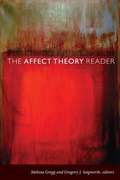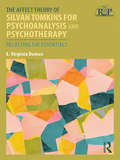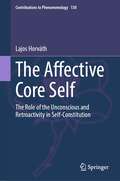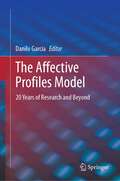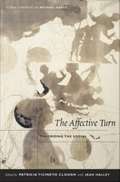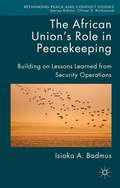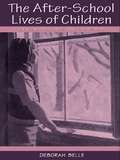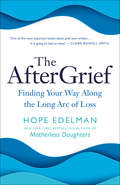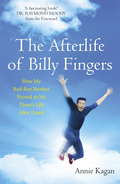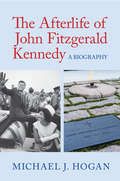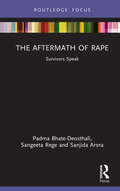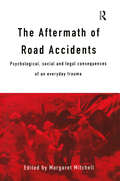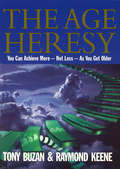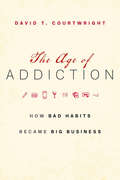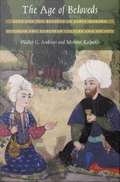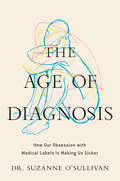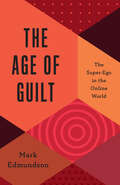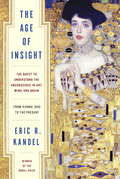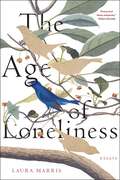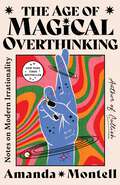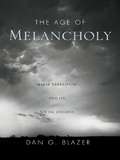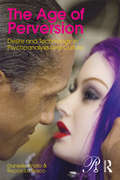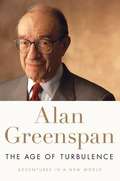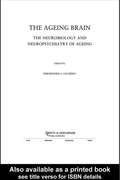- Table View
- List View
The Affect Theory Reader
by Melissa Gregg Gregory J. SeigworthThis field-defining collection consolidates and builds momentum in the burgeoning area of affect studies.
The Affect Theory of Silvan Tomkins for Psychoanalysis and Psychotherapy: Recasting the Essentials (Relational Perspectives Book Series)
by E. Virginia DemosThe Affect Theory of Silvan Tomkins for Psychoanalysis and Psychotherapy explores central issues in current clinical work, using the theories put forward by Silvan Tomkins and presenting them in detail, as well as integrating them with the most up-to-date neuroscience findings and infancy research, all based on a biopsychosocial, dynamic systems approach.Part I describes the essentials of life, based on our evolutionary and biological heritage, namely a need for a coherent understanding of one’s world and the capacity to act in that world; the infant's capacities are described in detail as embodying both. Longitudinal data is provided beginning at birth into the third year of life. Part II reviews current debates in psychoanalysis relating to motivation, and the lack of an internally consistent theory. Recent neuroscience findings are presented, which both negate drive theory, and support Tomkins' theory. His theory is then described in detail. In Part III, two case histories are presented: one is a clinical case illustrating one of Tomkins' affect powered scripts. The second case is drawn from a longitudinal study extending from birth, into early adulthood, which is made sense of with the help of Tomkins' theory. Demos concludes with a look at competing approaches to theory and responds to recent cognitive-based attempts to disprove both Tomkins' work and the latest findings from neuroscience. The Affect Theory of Silvan Tomkins for Psychoanalysis and Psychotherapy will appeal to psychoanalysts and psychoanalytic psychotherapists, as well as psychiatrists, psychologists, social workers, and psychiatric nurses.
The Affective Core Self: The Role of the Unconscious and Retroactivity in Self-Constitution (Contributions to Phenomenology #130)
by Lajos HorváthThis book extends the contemporary concept of the minimal self by introducing the affective core self. The overall aim is to integrate certain psychoanalytical ideas into the phenomenological investigation of passivity and reformulate the idea of the phenomenological unconscious. This volume contributes to the multidimensional analysis of the self by positioning the affective core self between the layers of the more minimal and the less minimal self. It underscores the importance of the unconscious in the constitution of the affective core self by providing the comparative analysis of the phenomenological and the psychoanalytical unconscious.Furthermore, comparisons are drawn between Freud’s conception of the afterwardsness of trauma and the phenomenological notion of retroactive sense-constitution. The book concludes that retroactive sense-making is a double-sided phenomenon and differentiates between implicit-bodily and conscious-narrative retroactive sense-constitution. In order to bolster the idea of implicit-bodily sense-constitution the volume also examines and utilizes contemporary insights on the nature of body memory. The conclusion claims that the affective core self is constituted in time by means of the underlying processes of the two-sided retroactive sense-constitution. This text appeals to students and researchers working in phenomenology and philosophy of mind.
The Affective Profiles Model: 20 Years of Research and Beyond
by Danilo GarciaThis timely volume provides an up-to-date exploration of the affective profiles model, a person-centered means of understanding the affective system. It presents the etiology underpinning the affective system and compares the model with other existing personality models, such as the Big Five Model, and the Cloninger’s Biopsychosocial Model. Most important, it examines the affective profiles model in relation to well-being, which includes life satisfaction, as well as psycho-logical health. As such, it illuminates the problems of depression, anxiety, and sleep disorders. Based on a wealth of longitudinal, cross-cultural and intervention studies, this book offers a critical view of the affective profiles model that will enrich both further research and clinical practice.
The Affective Turn: Theorizing the Social
by Patricia Ticineto Clough Jean Halley"The innovative essays in this volume . . . demonstrat[e] the potential of the perspective of the affects in a wide range of fields and with a variety of methodological approaches. Some of the essays . . . use fieldwork to investigate the functions of affects--among organized sex workers, health care workers, and in the modeling industry. Others employ the discourses of microbiology, thermodynamics, information sciences, and cinema studies to rethink the body and the affects in terms of technology. Still others explore the affects of trauma in the context of immigration and war. And throughout all the essays run serious theoretical reflections on the powers of the affects and the political possibilities they pose for research and practice. "--Michael Hardt, from the foreword In the mid-1990s, scholars turned their attention toward the ways that ongoing political, economic, and cultural transformations were changing the realm of the social, specifically that aspect of it described by the notion of affect: pre-individual bodily forces, linked to autonomic responses, which augment or diminish a body's capacity to act or engage with others. This "affective turn" and the new configurations of bodies, technology, and matter that it reveals, is the subject of this collection of essays. Scholars based in sociology, cultural studies, science studies, and women's studies illuminate the movement in thought from a psychoanalytically informed criticism of subject identity, representation, and trauma to an engagement with information and affect; from a privileging of the organic body to an exploration of nonorganic life; and from the presumption of equilibrium-seeking closed systems to an engagement with the complexity of open systems under far-from-equilibrium conditions. Taken together, these essays suggest that attending to the affective turn is necessary to theorizing the social. Contributors. Jamie "Skye" Bianco, Grace M. Cho, Patricia Ticineto Clough, Melissa Ditmore, Ariel Ducey, Deborah Gambs, Karen Wendy Gilbert, Greg Goldberg, Jean Halley, Hosu Kim, David Staples, Craig Willse , Elizabeth Wissinger , Jonathan R. Wynn
The African Union’s Role in Peacekeeping
by Isiaka A. BadmusThis study examines the African Union's peacekeeping role in managing African conflicts. Based on a qualitative research methodology, it analyses AU peace operations in Burundi and Somalia, and hybrid peacekeeping in Darfur, in order to identify the lessons learned and suggest how future outcomes may be improved.
The After-school Lives of Children: Alone and With Others While Parents Work
by Deborah BelleBased on research about after-school experiences and dilemmas conducted over a four-year period with employed parents and their children, this book draws on the stories these parents and children told--often using their actual words--to emphasize the wide variety of children's after-school arrangements, children's movement over time in and out of different arrangements, and the importance to children of multiple facets of their after-school arrangements, not simply the presence or absence of an adult caretaker. The book also emphasizes that children are not randomly assigned to after-school arrangements. Rather, parents and children struggle to reach optimal solutions to what are often difficult child care dilemmas. To understand these dilemmas, and the diverse strategies that families adopt, one must attend to the individual situations of children as family members understand them. This book was written to contribute to the development of new family and work policies and practices by illuminating the difficulties families face and their consequences for children. Written for psychologists, sociologists, and other social scientists who study families, maternal employment, child care, or child development, it will also be useful for parents, educators, community leaders, and public policymakers concerned about the well being of children whose parents are employed.
The AfterGrief: Finding Your Way Along the Long Arc of Loss
by Hope EdelmanA validating new approach to the long-term grieving process that explains why we feel &“stuck,&” why that&’s normal, and how shifting our perception of grief can help us grow—from the New York Times bestselling author of Motherless Daughters&“This is perhaps one of the most important books about grief ever written. It finally dispels the myth that we are all supposed to get over the death of a loved one.&”—Claire Bidwell Smith, author of Anxiety: The Missing Stage of GriefAren&’t you over it yet? Anyone who has experienced a major loss in their past knows this question. We&’ve spent years fielding versions of it, both explicit and implied, from family, colleagues, acquaintances, and friends. We recognize the subtle cues—the slight eyebrow lift, the soft, startled &“Oh! That long ago?&”—from those who wonder how an event so far in the past can still occupy so much precious mental and emotional real estate.Because of the common but false assumption that grief should be time-limited, too many of us believe we&’re grieving &“wrong&” when sadness suddenly resurges sometimes months or even years after a loss. The AfterGrief explains that the death of a loved one isn&’t something most of us get over, get past, put down, or move beyond. Grief is not an emotion to pass through on the way to &“feeling better.&” Instead, grief is in constant motion; it is tidal, easily and often reactivated by memories and sensory events, and is re-triggered as we experience life transitions, anniversaries, and other losses. Whether we want it to or not, grief gets folded into our developing identities, where it informs our thoughts, hopes, expectations, behaviors, and fears, and we inevitably carry it forward into everything that follows.Drawing on her own encounters with the ripple effects of early loss, as well as on interviews with dozens of researchers, therapists, and regular people who&’ve been bereaved, New York Times bestselling author Hope Edelman offers profound advice for reassessing loss and adjusting the stories we tell ourselves about its impact on our identities. With guidance for reframing a story of loss, finding equilibrium within it, and even experiencing renewed growth and purpose in its wake, she demonstrates that though grief is a lifelong process, it doesn&’t have to be a lifelong struggle.
The Afterlife of Billy Fingers: Life, Death and Everything Afterwards
by Annie KaganIn 2004, bad boy Billy Fingers Cohen, a homeless small-time drug dealer and addict in a state of drug induced euphoria ran into a busy intersection and was killed instantly by a speeding automobile. He left behind a grieving sister. For weeks she struggled with grief and tried to make sense of Billy's seemingly wasted life and tragic death.A few weeks after his death, William Cohen, aka Billy Fingers, woke his sister Annie at dawn. 'I'm drifting weightlessly through these glorious stars and galaxies and I feel a Divine Presence, a kind, loving beneficent presence, twinkling all around me.'Billy's ongoing after-death communications take his sister on an unprecedented journey into the bliss and wonder of life beyond death. Billy's profound, detailed description of the mystical realms he traverses, the Beings of Light that await him, and the wisdom he receives take the reader beyond the near-death experience. Billy is, indeed, as Dr. Raymond Moody points out in his foreword, explaining the phenomena we've known about since ancient times, an afterworld walker. A fascinating page-turner filled with wisdom, humour and hope, The Afterlife of Billy Fingers, will forever change your views about life, death and the hereafter.If I could give you a gift it would be to find the glory inside yourself, beyond the roles and the drama, so you can dance the dance of the game of life with a little more rhythm, a little more abandon, a little more shaking-those-hips.
The Afterlife of John Fitzgerald Kennedy
by Michael J. HoganIn his new book, Michael J. Hogan, a leading historian of the American presidency, offers a new perspective on John Fitzgerald Kennedy, as seen not from his life and times but from his afterlife in American memory. The Afterlife of John Fitzgerald Kennedy considers how Kennedy constructed a popular image of himself, in effect, a brand, as he played the part of president on the White House stage. The cultural trauma brought on by his assassination further burnished that image and began the process of transporting Kennedy from history to memory. Hogan shows how Jacqueline Kennedy, as the chief guardian of her husband's memory, devoted herself to embedding the image of the slain president in the collective memory of the nation, evident in the many physical and literary monuments dedicated to his memory. Regardless of critics, most Americans continue to see Kennedy as his wife wanted him remembered: the charming war hero, the loving husband and father, and the peacemaker and progressive leader who inspired confidence and hope in the American people.
The Aftermath of Rape: Survivors Speak
by Sangeeta Rege Padma Bhate-Deosthali Sanjida AroraThis book documents the journey of the survivors of sexual violence as they navigate the gruelling criminal justice and health care systems and the stigma and hostility in their communities in the aftermath of the incident. Through personal narratives of survivors and their family members, the book examines critical gaps in the existing networks of criminal procedure, health, and rehabilitation for survivors of sexual violence and rape. Using qualitative research, it distills the narratives gathered through interviews with survivors and their family members to understand their experiences and offers. The book contributes to the corpus of literature on different forms of violence against women in India with an emphasis on understanding the effectiveness of institutions, both formal and informal, in responding to sexual violence, and offering suggestions for changes in the health and support systems available to them. It documents post-incident interactions of survivors with family, community, the police, courts, lawyers, and hospitals and highlights the impact of rape on physical and mental health, work, relationships, education and housing for survivors and their families. This book will be of interest to those engaged in providing support to survivors of sexual violence as well as students and researchers of social work and social policy, health and social care, law, gender studies, human rights and civil liberties, gender and sexuality, social welfare, and mental health.
The Aftermath of Road Accidents: Psychological, Social and Legal Consequences of an Everyday Trauma
by Margaret MitchellAccidents on the road are so common place in our lives today it's easy to believe that there are plenty of support systems in place for the victims. Death and injuries on the road are construed primarily as medico-legal phenomena, re-inforced both by the way accidents are described and by issues of insurance and compensation for damage and personal injury. But there are many profound psychological and social consequences that remain underestimated. Margaret Mitchell has compiled this collection from leading researchers to examine this neglected area for the unseen victims: the families who have to cope with bereavement or a disabled relative, the driver who has killed but is medically uninjured. It will be of great direct value to psychologists, psychiatrists and other health professionals and will serve as a useful reference for those in the legal profession, voluntary associations and those with personal experience of road, traffic, accidents needing advice about where to seek further help.
The Age Heresy: How to Achieve More - Not Less - As You Get Older
by Buzan , Tony And Keene , RaymondIt is widely assumed that as we grow older there is a gradual decline in the way we use our brains. This book draws on acclaimed and proven scientific evidence to put forward a sensational brand-new theory which explodes the myth and shows that, with the right sort of mental and physical exercise, you can actually significantly improve your brain power as you get older. Drawing upon a wealth of fascinating facts and records, with studies of great geniuses such as Einstein and Goethe who improved with age, THE AGE HEARSY is packed with practical advice and guidance on how you can actively learn to enhance your memory, powers of creativity and concentration.
The Age of Addiction: How Bad Habits Became Big Business
by David T. CourtwrightWe live in an age of addiction, from compulsive gaming and shopping to binge eating and opioid abuse. What can we do to resist temptations that insidiously and deliberately rewire our brains? Nothing, David Courtwright says, unless we understand the global enterprises whose “limbic capitalism” creates and caters to our bad habits.
The Age of Beloveds: Love and the Beloved in Early-Modern Ottoman and European Culture and Society
by Walter G. Andrews Mehmet KalpaklıThe Age of Beloveds offers a rich introduction to early modern Ottoman culture through a study of its beautiful lyric love poetry. At the same time, it suggests provocative cross-cultural parallels in the sociology and spirituality of love in Europe--from Istanbul to London--during the long sixteenth century. Walter G. Andrews and Mehmet Kalpakli provide a generous sampling of translations of Ottoman poems, many of which have never appeared in English, along with informative and inspired close readings. The authors explain that the flourishing of Ottoman power and culture during the "Turkish Renaissance" manifested itself, to some degree, as an "age of beloveds," in which young men became the focal points for the desire and attention of powerful officeholders and artists as well as the inspiration for a rich literature of love. The authors show that the "age of beloveds" was not just an Ottoman, eastern European, or Islamic phenomenon. It extended into western Europe as well, pervading the cultures of Venice, Florence, Rome, and London during the same period. Andrews and Kalpakli contend that in an age dominated by absolute rulers and troubled by war, cultural change, and religious upheaval, the attachments of dependent courtiers and the longings of anxious commoners aroused an intense interest in love and the beloved. The Age of Beloveds reveals new commonalities in the cultural history of two worlds long seen as radically different.
The Age of Charisma
by Young Jeremy C.An innovative examination of American society, culture, and politics, The Age of Charisma argues that the modern relationship between American leaders and followers grew out of a unique group of charismatic social movements prominent in the late-nineteenth and early-twentieth centuries. Drawing on hundreds of letters and testimonials, Jeremy C. Young illustrates how 'personal magnetism' in public speaking shaped society by enabling a shift from emotionally-inaccessible leadership to emotionally-available leadership. This charismatic speaking style caused a rapid transformation in the leader-follower relationship, creating an emotional link between speakers and listeners, and the effects of this social transformation remain with us today. Young argues that ultimately, charismatic movements enhanced American democracy by encouraging the personalization of leadership - creating a culture in which today's leaders appeal directly to Americans through mass media.
The Age of Diagnosis: How Our Obsession with Medical Labels Is Making Us Sicker
by Suzanne O'SullivanFrom a neurologist and the award-winning author of The Sleeping Beauties, a meticulous and compassionate exploration of how our culture of medical diagnosis can harm, rather than help, patients.We live in an age of diagnosis. Conditions like ADHD and autism are on the rapid rise, while new categories like long Covid are being created. Medical terms are increasingly used to describe ordinary human experiences, and the advance of sophisticated genetic sequencing techniques means that even the healthiest of us may soon be screened for potential abnormalities. More people are labeled "sick" than ever before—but are these diagnoses improving their lives?With scientific authority and compassionate storytelling, neurologist Suzanne O'Sullivan argues that our obsession with diagnosis is harming more than helping. It is natural when we are suffering to want a clear label, understanding, and, of course, treatment. But our current approach to diagnosis too often pathologizes difference, increases our anxiety, and changes our experience of our bodies for the worse.Through the moving stories of real people, O'Sullivan compares the impact of a medical label to the pain of not knowing. She explains the way the boundaries of a diagnosis can blur over time. Most importantly, she calls for us to find new and better vocabularies for suffering and to find ways to support people without medicalizing them.
The Age of Guilt: The Super-Ego in the Online World
by Mark EdmundsonHow Freud&’s concept of the super-ego can help us to understand the harsh cultural climate of the digital age Cancellation, scapegoating, raving on Twitter. How did the Internet, which began as a place for open thought and exchange, become a forum for cruelty and judgment? Can a whole culture become mentally ill? How do we understand and respond to this problem? Mark Edmundson views contemporary culture and discourse through Freud&’s concept of the super-ego, the moralistic and frequently irrational inner judge. The poet William Blake was attuned to this &“dark pressure of self-condemnation,&” and Nietzsche knew its power as well. One way to mitigate (temporarily) the self-judgment of the super-ego is to aim it outward instead, judging and even punishing others for supposed infractions. Naturally these targets fight back, resulting in a cascade of bitterness and even hatred. Edmundson traces the destructive passion of the super-ego on politics, race, gender, class, education, and more, drawing on psychological studies, classroom experience, and the work of Adam Phillips and Slavoj Žižek. Edmundson proposes ways to manage the super-ego and even to transform it into an affirmative power. In The Age of Guilt, Edmundson renews the promise of Freudian theory as he explores our unique social moment with psychological insight, humanity, and erudition.
The Age of Insight: The Quest to Understand the Unconscious in Art, Mind, and Brain, from Vienna 1900 to the Present
by Eric KandelA brilliant book by Nobel Prize winner Eric R. Kandel, The Age of Insight takes us to Vienna 1900, where leaders in science, medicine, and art began a revolution that changed forever how we think about the human mind--our conscious and unconscious thoughts and emotions--and how mind and brain relate to art. At the turn of the century, Vienna was the cultural capital of Europe. Artists and scientists met in glittering salons, where they freely exchanged ideas that led to revolutionary breakthroughs in psychology, brain science, literature, and art. Kandel takes us into the world of Vienna to trace, in rich and rewarding detail, the ideas and advances made then, and their enduring influence today. The Vienna School of Medicine led the way with its realization that truth lies hidden beneath the surface. That principle infused Viennese culture and strongly influenced the other pioneers of Vienna 1900. Sigmund Freud shocked the world with his insights into how our everyday unconscious aggressive and erotic desires are repressed and disguised in symbols, dreams, and behavior. Arthur Schnitzler revealed women's unconscious sexuality in his novels through his innovative use of the interior monologue. Gustav Klimt, Oscar Kokoschka, and Egon Schiele created startlingly evocative and honest portraits that expressed unconscious lust, desire, anxiety, and the fear of death. Kandel tells the story of how these pioneers--Freud, Schnitzler, Klimt, Kokoschka, and Schiele--inspired by the Vienna School of Medicine, in turn influenced the founders of the Vienna School of Art History to ask pivotal questions such as What does the viewer bring to a work of art? How does the beholder respond to it? These questions prompted new and ongoing discoveries in psychology and brain biology, leading to revelations about how we see and perceive, how we think and feel, and how we respond to and create works of art. Kandel, one of the leading scientific thinkers of our time, places these five innovators in the context of today's cutting-edge science and gives us a new understanding of the modernist art of Klimt, Kokoschka, and Schiele, as well as the school of thought of Freud and Schnitzler. Reinvigorating the intellectual enquiry that began in Vienna 1900, The Age of Insight is a wonderfully written, superbly researched, and beautifully illustrated book that also provides a foundation for future work in neuroscience and the humanities. It is an extraordinary book from an international leader in neuroscience and intellectual history.
The Age of Loneliness: Essays
by Laura MarrisIn this debut essay collection, Laura Marris reframes environmental degradation by setting aside the conventional, catastrophic framework of the Anthropocene in favor of that of the Eremocene, the age of loneliness, marked by the dramatic thinning of wildlife populations and by isolation between and among species. She asks: how do we add to archives of ecological memory? How can we notice and document what's missing in the landscapes closest to us?Filled with equal parts alienation and wonder, each essay immerses readers in a different strange landscape of the Eremocene. Among them are the Buffalo airport with its snowy owls and the purgatories of commuter flights, layovers, and long-distance relationships; a life-size model city built solely for self-driving cars; the coasts of New England and the ever-evolving relationship between humans and horseshoe crabs; and the Connecticut woods Marris revisits for the first time after her father’s death, where she participates in the annual Christmas Bird Count and encounters presence and absence in turn.Vivid, keenly observed, and driven by a lively and lyrical voice, The Age of Loneliness is a moving examination of the dangers of loneliness, the surprising histories of ecological loss, and the ways that community science—which relies on the embodied evidence of “ground truth”—can help us recognize, and maybe even recover, what we’ve learned to live without.
The Age of Magical Overthinking: Notes on Modern Irrationality
by Amanda MontellINSTANT NEW YORK TIMES BESTSELLER A BookPage Best Nonfiction Book of 2024 From the bestselling author of Cultish and host of the podcast Sounds Like a Cult, a delicious blend of cultural criticism and personal narrative that explores our cognitive biases and the power, disadvantages, and highlights of magical thinking. Utilizing the linguistic insights of her &“witty and brilliant&” (Blyth Roberson, author of America the Beautiful?) first book Wordslut and the sociological explorations of her breakout hit Cultish, Amanda Montell now turns her erudite eye to the inner workings of the human mind and its biases in her most personal and electrifying work yet. &“Magical thinking&” can be broadly defined as the belief that one&’s internal thoughts can affect unrelated events in the external world: think of the conviction that one can manifest their way out of poverty, stave off cancer with positive vibes, thwart the apocalypse by learning to can their own peaches, or transform an unhealthy relationship to a glorious one with loyalty alone. In all its forms, magical thinking works in service of restoring agency amid chaos, but in The Age of Magical Overthinking, Montell argues that in the modern information age, our brain&’s coping mechanisms have been overloaded, and our irrationality turned up to an eleven. In a series of razor sharp, deeply funny chapters, Montell delves into a cornucopia of the cognitive biases that run rampant in our brains, from how the &“halo effect&” cultivates worship (and hatred) of larger-than-life celebrities, to how the &“sunk cost fallacy&” can keep us in detrimental relationships long after we&’ve realized they&’re not serving us. As she illuminates these concepts with her signature brilliance and wit, Montell&’s prevailing message is one of hope, empathy, and ultimately forgiveness for our anxiety-addled human selves. If you have all but lost faith in our ability to reason, Montell aims to make some sense of the senseless. To crack open a window in our minds, and let a warm breeze in. To help quiet the cacophony for a while, or even hear a melody in it.
The Age of Melancholy: "Major Depression" and its Social Origin
by Dan G. BlazerDepression has become the most frequently diagnosed chronic mental illness, and is a disability encountered almost daily by mental health professionals of all trades. "Major Depression" is a medical disease, which some would argue has reached epidemic proportions in contemporary society, and it affects our bodies and brains just like any other disease. Why, this book asks, has the incidence of depression been on such an increase in the last 50 years, if our basic biology hasn't changed as rapidly? To find answers, Dr. Blazer looks at the social forces, cultural and environmental upheavals, and other external, group factors that have undergone significant change. In so doing, the author revives the tenets of social psychiatry, the process of looking at social trends, environmental factors, and correlations among groups in efforts to understand psychiatric disorders.
The Age of Perversion: Desire and Technology in Psychoanalysis and Culture (Psychoanalysis in a New Key Book Series)
by Danielle Knafo Rocco Lo BoscoAmerican Board and Academy of Psychoanalysis Book Prize Winner for 2018 (Theoretical Category) We have entered the age of perversion, an era in which we are becoming more like machines and they more like us.The Age of Perversion explores the sea changes occurring in sexual and social life, made possible by the ongoing technological revolution, and demonstrates how psychoanalysts can understand and work with manifestations of perversion in clinical settings. Until now theories of perversion have limited their scope of inquiry to sexual behavior and personal trauma. The authors of this book widen that inquiry to include the social and political sphere, tracing perversion’s existential roots to the human experience of being a conscious animal troubled by the knowledge of death. Offering both creative and destructive possibilities, perversion challenges boundaries and norms in every area of life and involves transgression, illusion casting, objectification, dehumanization, and the radical quest for transcendence. This volume presents several clinical cases, including a man who lived with and loved a sex doll, a woman who wanted to be a Barbie doll, and an Internet sex addict. Also examined are cases of widespread social perversion in corporations, the mental health care industry, and even the government. In considering the continued impact of technology, the authors discuss how it is changing the practice of psychotherapy. They speculate about what the future may hold for a species who will redefine what it means to be human more in the next few decades than during any other time in human history. The Age of Perversion provides a novel examination of the convergence of perversion and technology that will appeal to psychoanalysts and psychoanalytic psychotherapists, social workers, mental health counselors, sex therapists, sexologists, roboticists, and futurists, as well as social theorists and students and scholars of cultural studies.
The Age of Turbulence: Adventures in a New World
by Alan GreenspanAutobiography of the Chairman of the Federal Reserve Board, along with his analysis of the emerging global economy.
The Ageing Brain (Studies on Neuropsychology, Development, and Cognition)
by Perminder S. SachdevWhen confronted with a neurological or psychiatric disorder in an elderly individual, a clinician or researcher is likely to ask how the processes of ageing have influenced the aetiology and presentation of the disorder, and will impact on its efficient management. There are many urban myths about ageing, and some of these apply to the brain. The r
